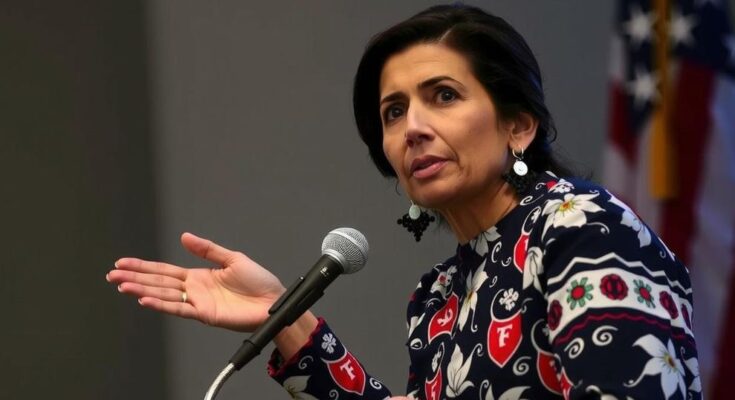Tulsi Gabbard’s nomination as Trump’s Director of National Intelligence is facing scrutiny due to her controversial past, including a meeting with Assad and critical views on U.S. involvement abroad, raising concerns about intelligence cooperation with allies. Her appointment could lead to significant geopolitical implications, especially in light of her perceived alignment with Russian narratives during the Ukraine conflict.
Former Congresswoman Tulsi Gabbard has recently come under scrutiny following her selection by President-elect Donald Trump to serve as the Director of National Intelligence (DNI). Gabbard, known for her anti-war stance and past controversial positions regarding Syria and Russia, is viewed by some as potentially undermining U.S. intelligence cooperation with allies. Critics, including former national security officials and lawmakers, express concern over her judgments and statements perceived as sympathetic to authoritarian regimes.
Notably, Gabbard’s 2017 meeting with Syrian President Bashar al-Assad and her dismissal of U.S. intelligence regarding chemical weapons use by Syrian forces have raised alarms. Furthermore, her comments during the Russia-Ukraine conflict, which seemed to resonate with narratives used by the Kremlin, have intensified doubts amongst her critics. While Trump lauds her military background and calls for a fearless approach to intelligence, detractors emphasize the potential risks her confirmation poses to sensitive intelligence-sharing alliances.
Former diplomats and security officials worry that Gabbard’s views may impact the level of trust foreign allies place in U.S. intelligence, especially if they perceive her as possessing fundamentally divergent perspectives on critical geopolitical issues. Despite this, supporters like Republican Senator Markwayne Mullin advocate for her candidacy, emphasizing the need for open dialogue rather than premature judgments. Gabbard’s path towards confirmation is anticipated to be contentious, given the highly sensitive nature of the DNI role and the implications of her past positions on global affairs.
This scrutiny emerges amidst Gabbard’s nomination for a pivotal role overseeing U.S. intelligence agencies, particularly as she has previously expressed stances that challenge mainstream narratives regarding foreign conflicts. Her history of opposition to military interventions and advocacy for diplomacy raises questions about her approach towards intelligence operations and international relations. Moreover, her meeting with Assad and controversial comments regarding U.S. foreign policy have placed her under critical examination by both political factions, further complicating her confirmation process.
In summary, Tulsi Gabbard’s nomination as Director of National Intelligence has sparked significant controversy, revealing deep divisions among national security experts and lawmakers regarding her fitness for the position. While she has supporters who highlight her military experience and unique perspectives on interventionism, numerous detractors express grave concerns over the implications of her views on U.S. intelligence-sharing relationships. The Senate’s confirmation process is poised to be a battleground of competing narratives surrounding her past actions and statements.
Original Source: www.bbc.com




